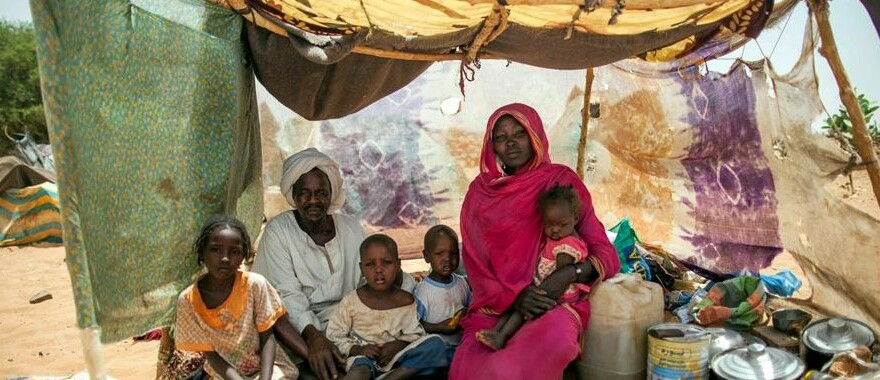Displaced persons fleeing from the Abuja and Naivasha camps due to clashes between the Sudanese army and Rapid Support Forces find themselves in dire conditions in Zamzam camp, located 15 km west of El Fasher in North Darfur State.
With a population exceeding 400,000, the majority originally fled their villages in the Tawila and Dar es Salaam localities during the early Darfur events in 2003. Later, hundreds of families sought refuge in Abuja and Naivasha camps following battles between the Sudanese army and Rapid Support Forces last year.
Speaking to Radio Tamazuj, residents of Zamzam camp disclosed the severity of the food and humanitarian crisis they face. They have sought shelter in Zamzam Secondary Schools between Al Salam 18 after leaving their homes north of El Fasher.
Jidu Adam Yousif, a representative of the displaced people in the two schools comprising about 800 families, spends his days traversing between trees to address the complaints of families who are forced to sleep in the open.
“We are facing critical shortages of food, shelter tents, and drinking water. Despite reaching out to various organizations, including relief agencies and the International Committee of the Red Cross, assistance has been directed to those fleeing Nyala and Tawila near us, overlooking the needs of El Fasher’s displaced residents,” Yousif explained.
Highlighting the vulnerable members of their community, Yousif noted, “Among us are children and the elderly, grappling with insufficient supplies of food, medicine, and drinking water. Tragically, we lost three children to hunger due to a lack of adequate resources. While aid was provided, it fell short of meeting the displaced population’s needs.”
Describing the desperate situation, Yousif stated, “Children are resorting to begging in markets to support their families amidst these harsh living conditions.”
Another displaced individual, Hawa Haroun Al-Hajj, a mother of three, shared her family’s ordeal. They fled the Abuja camp on foot three months ago due to the difficulties arising from armed clashes between the army and the paramilitary Rapid Support Forces.
Al-Hajj expressed the harsh realities of their existence, saying, “We are living in difficult conditions, lacking food and struggling to obtain drinking water and blankets, especially in the cold weather. While we received flour and some provisions for families, it was insufficient for our needs, leading us to share the flour with our children as we had no other alternatives.”
Nahid Abdel Razzaq, representing women, highlighted the dire living conditions of the displaced in Boys’ Secondary School and Al-Salam 18 School due to severe food shortages. Meanwhile, El-Fasher has become increasingly unsafe and unsuitable for habitation due to ongoing clashes. Humanitarian organizations have been urged to intervene and assist those fleeing Zamzam camp.
Médecins Sans Frontières (MSF), also known as Doctors Without Borders, recently raised concerns about the escalating malnutrition rates among children in Zamzam camp. Shockingly, the death toll among children has surged to 13 per day, according to MSF’s alert.
In early February, the Coordination of Displaced Persons in IDP camps issued a statement, warning of catastrophic humanitarian conditions affecting elderly IDPs in Darfur, western Sudan.




